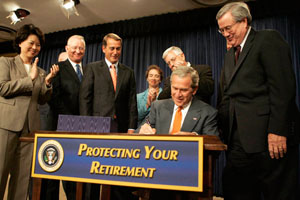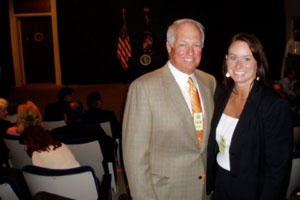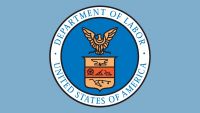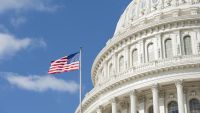MCAA Attends Pension Bill Signing at White House

Last week, MCAA President Frank Campitelli and MCAA Director of Government Affairs Jessica Johnson Bennett were in attendance at the White House when President Bush signed what Lawmakers in Washington deemed the most important piece of legislation the 109th Congress has dealt with. On Thursday, August 17th, President Bush signed H.R. 4, the Pension Protection Act of 2006.
While the 109th Congress has been dubbed by some as the "do nothing" Congress. Both Republicans and Democrats have been pointing fingers at each other for months. Leading many in Washington and around the Country to the conclusion that there was little chance any significant legislation would be passed before the mid-term elections in November. However, the last week before Congress headed home for the August recess, proved to be one of the most productive all year. Lawmakers were able to put aside partisan politics allowing both the House and Senate to pass what lawmakers considered to be one of the most critical pieces of legislation this Congress would take up. Much to the relief of labor, business groups and troubled airlines, Pension Reform legislation passed by a wide margin just hours before both Chambers adjourned for the month of August. This comes after years of debate and months of heated negotiations.
Since early 2005 Congress has worked on legislation that would strengthen the private pension system to make sure companies met promises to retirees and to shore up the finances of the federal agency that insures private pensions, the Pension Benefit Guaranty Corporation (PBGC).
Lawmakers considered the pension bill to be crucial, because it is designed to address the under funded pension plans that have forced the federal government to step in after a series of high-profile bankruptcies. In recent years the PBGC has reported record deficits, following a series of bankruptcies in the airlines, steel and auto parts industries, and the most well known, Enron. Lawmakers strove to balance the need to have companies quickly make up for shortfalls in their defined-benefit pension plans with concern that language that was too restrictive could lead companies to foist their plans on the PBGC, which would place an even further strain on an already struggling agency.
"Many Americans work for private companies that offer traditional pensions, and most of those companies are meeting their obligations to their employees and their retirees. Yet, some businesses are not putting away the cash they need to fund the pensions they promised to their workers. These companies get into financial trouble and go bankrupt, their underfunded pension plans can leave some retirees with checks much smaller than the ones they were promised," said President Bush.
The PBGC, which acts as an insurance system for businesses offering private pensions, is funded by premiums collected from employers such as Mason Contractors. When some businesses fail to fund their pension plans and are unable to meet their obligations to their employees, it puts a strain on the entire system.
According to President Bush, "If there's not enough money in the system to cover all the extra costs, American taxpayers could be called on to make up the shortfall. Every American has an interest in seeing this system fixed, whether you're a worker at a company with an underfunded pension, or a taxpayer who might get stuck with the bill."

The Pension Protection Act of 2006 will help shore up our pension insurance system in several key ways. The bill requires companies who underfund their pension plans to pay additional premiums. In addition, the legislation extends the requirement that companies that terminate their pensions must provide extra funding for the system. This legislation insists that companies measure their obligations of their pension plans more accurately. It also closes loopholes that allow underfunded plans to skip pension payments. Furthermore, the legislation raises caps on the amount that employers can put into their pension plans so they can add more money during good times and build up a cushion that can keep pensions solvent in lean times.
Finally, this legislation prevents companies with underfunded pension plans from digging the hole deeper by promising extra benefits to their workers without paying for those promises up front. Unfortunately, the problem of underfunded pensions will not be eliminated overnight. However this bill establishes sound standards for pension funding, yet, in the end, the primary responsibility rests with employers to fund the pension promises as soon as they can.
In addition to reforming the laws governing traditional private pensions, the bill President signed contains provisions to help workers who save for retirement through defined contribution plans like IRAs and 401(k)s. These savings plans are helping Americans build a society of ownership and financial independence.
This legislation will make it easier for workers to participate in these plans. It will remove barriers that prevent companies from automatically enrolling their employees in these savings plans, ensure that workers have more information about the performance of their accounts, provide greater access to professional advice about investing safely for retirement, and give workers greater control over how their accounts are invested.
This bill also makes permanent the higher contribution limits for IRAs and 401(k)s that Congress passed in 2001, in turn that will enable more workers to build larger nest eggs for retirement.
President Bush stressed, "To ensure more secure retirement for all Americans we've got more work to do."
The legislation requires companies to make payments to cover current shortfalls in the funding of their pension plans. Companies would have to fund 100 percent of pension liabilities, up from 90 percent under the current law. Most companies would have seven years to make up for shortfalls. However, airlines which had been a driving force behind the legislation were given a further respite, receiving up to 17 years to recover from shortfalls. Some airlines had threatened to dump their struggling plans on the PBGC if their demands were not met. In addition, companies will also be required to adjust the way they evaluate plan liabilities, revising current measures to better reflect when promised benefits would have to be paid.
In closing President Bush stated, "Today, we've taken an important step toward ensuring greater retirement security for millions of American workers. I want to thank the House and the Senate for their good work on this vital legislation. It's been hard work. It took a lot of pages to write that bill, as you can see. But the members did good work, and now I'd ask them to join me as I sign into law the Pension Protection Act of 2006."
The Pension Protection Act of 2006 will take effect immediately.
About the Author
Jessica Johnson Bennett was the Director of Government Affairs for MCAA. She has an extensive background in public affairs and government relations. Her expertise in strategic planning, PAC management and operations help on key policy issues.


















